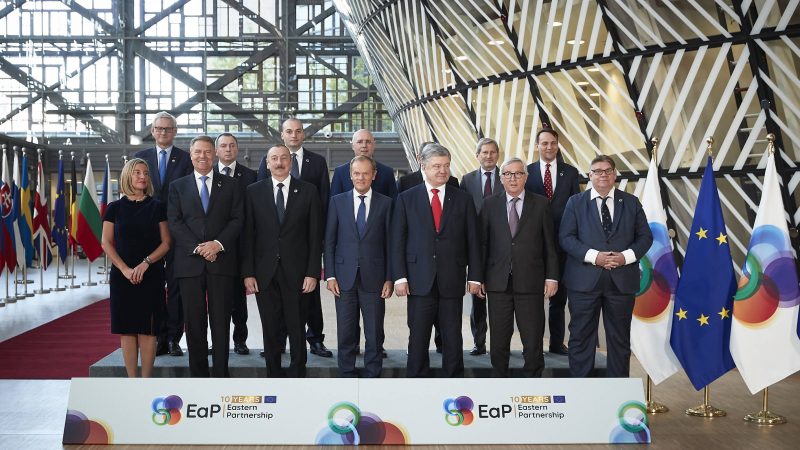While European societies take stock on the impact the COVID-19 pandemic on the EU, it has been increasingly common to hear that the pandemic proved the need for the EU to be more strategically sovereign. No doubt about that. But the real test for EU power and its strategic sovereignty won’t be in masks, but on how the EU deals with external problems, not least in its neighbourhood, write Nicu Popescu and Gustav Gressel.
Nicu Popescu is the director of the European Council of Foreign Relations’ Wider Europe Programme; Gustav Gressel is senior policy fellow.
As the EU is preparing a summit in June with the Eastern Partnership states (COVID19 conditions allowing) the agenda of that summit still looks like a throwback to the pre-geopolitical good old days when Russia was not invading neighbours, China was a ‘responsible stakeholder’ meekly ‘bidding its time’, and the US was an inclusive, multilateralist, and ready to cover for EU inaction in certain domains like security and defence. None of those conditions hold true today. And this dictates the EU a need to significantly scale up its policies in the neighbourhood.
The EU is already marginalised, and not very relevant for the hardest dossiers in its southern neighbourhood: Syria, Libya, the Israeli-Palestine conflict and broader regional dynamics. The EU is less influential on Turkey than it has been in decades. The state of EU’s influence and relevance in Eastern Europe is not as poor, but the prospects don’t look good. And it’s not because of the US, China or Russia, but because of EU’s own choice to avoid dealing with hard security matters and concentrate on its socio-economic goals.
In the last decade the EU has invested billions in aid and loans in its neighbourhood. It hosted dozens of summits, beefed up its diplomatic presence, agreed on free trade areas, helped improve energy security, and liberalised travel and visa-regimes in its Eastern neighbourhood. Achievements have been plenty. But few of them are irreversible. They can all be foiled by the eroding security situation. EU’s neighbours are under a constant security assault: from propaganda, dirty political party finance from abroad, cyber-attacks on critical infrastructure, intelligence subversion, and, as Ukraine proved, open military aggression.
In the past, strengthening the resilience of Eastern Neighbourhood states in matters of security and defence was mostly left to Washington. The US took the lead in helping states on defence assistance and reforms, intelligence cooperation, and cyber security. Because the US was virtually the only such helper on matters of state survival for countries like Ukraine, Georgia and Moldova the US also gained significant ‘premium’ leverage. EU’s financial assistance could not always buy the same degree of influence. Certainly, the US and the EU worked together to insist on critical reforms.
But this arrangement is threatened now. The way Ukraine ended up enmeshed in Trump’s failed impeachment left deep scars on the political landscapes of both Eastern Europe and Washington. The mistrust between President Trump and most of those senior policy makers who are supposed to implement policies on eastern Europe is certainly inhibiting US influence and credibility.
One might think, under these circumstances the EU would engage in a major scaling up of its Eastern Partnership policy. But that is far from certain. Even though the EU institutions have the ambitions and the desire to significantly scale it up, there is a strong current among some member states to keep the EU as ungeopolitical as possible in Eastern Europe. In recent months some member states tried to completely deprive the Eastern Partnership conversation of any security ambition. There was even an attempt to relegate the EaP to matters of environment, fighting inequalities and boosting youth exchanges.
A rather large and otherwise ambitious member state even argued that the EaP should have nothing to deal even with ‘cyber security’, let alone harder security matters, in order not to irritate Russia. Such positioning is not unlike Donald Trump’s isolationist disengagement.
If Europe is indeed ready and willing to become more geopolitical, and strategically autonomous, it is time to show that in its Eastern Partnership policy. One way to do so is to launch an Eastern Partnership Security Compact: an initiative bringing together EU funds and institutions with the capabilities of EU member states willing to boost security cooperation with EU’s neighbours. Some EU member states already have some modest cooperation initiatives in security and defence. But these are fragmented, poorly coordinated and not very resourceful.
The idea is to merge, and scale up such already ongoing cooperation. Such a compact would seek to boost both assistance and cooperation on intelligence coordination, security sector support, cyber security, and increased military cooperation.
On the latter a “foreign military sales programme” akin to the US, under which partners can purchase selective European military equipment for special loans could be part of the initiative. Reshaping military training, education, defence and comprehensive national security planning is also needed. On intelligence and cyber, capacity building programmes and closer cooperation to early on identify clandestine threats and subversive structures is paramount.
Such a package would also help EU’s ability to foster and support reforms within the cyber-, security-, intelligence-, and defence-sector, particularly regarding the public accountability, rule of law, and most important the fight against corruption.
It is time for the EU to stop being afraid of its own shadow in security matters. Without dealing with such sensitive, and un-Brussels-like issues, the EU influence, effectiveness and strategic sovereignty ambitions will always hit glass ceiling. It is time to start investing in security partnerships with its neighbours. Such partnerships should not be linked to the complex issue of EU and NATO enlargements. The point is to strengthen EU’s allies’ capabilities and start turning the EU into a full-spectrum power in its own neighbourhood. Or else, the EU power risks going down the route of growing irrelevance, as it did in the Southern Mediterranean in the last decade.



